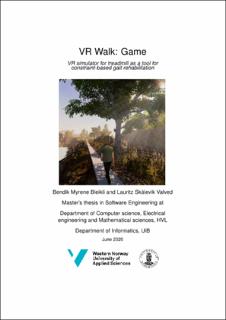VR Walk: Game. VR simulator for treadmill as a tool for constraint-based gait rehabilitation
Master thesis
Permanent lenke
https://hdl.handle.net/11250/3126424Utgivelsesdato
2020-06-06Metadata
Vis full innførselSamlinger
Sammendrag
The viability of Virtual Reality (VR) is being explored in an increasing number of fields outside its primary use in entertainment. A notable example is VR therapy, where VR-based alternatives to exposure therapy and post-stroke rehabilitation have proven especially effective. Treadmill-walking paired with monitor-based game activities is a popular gait rehabilitation tool within physiotherapy. While, to the authors' knowledge, no equivalent immersive VR-based solutions currently exist outside of experimental stages, recent research has shown that doing activities in VR while walking on a treadmill notably affects the user's gait. This indicates that VR-based gait rehabilitation might be a viable alternative while also addressing the issues of lacking immersion and motivation for continued training present in current solutions. This thesis revolves around the development and evaluation of an immersive VR simulator for treadmill usage, intended to further explore the viability of such a solution within gait rehabilitation. While clinical testing was outside of the scope of the thesis, the resulting software solution was to be evaluated through demonstration for, and a subsequent semi-structured interview with, physiotherapists and VR rehabilitation researchers. However, the outbreak of COVID-19 lead to the cancellation of the demonstration and interview. Instead, this thesis will detail the intended processing of the interview feedback and results and how these might have been used to appraise the simulator as a viable tool within gait rehabilitation according to the three primary factors of the Extended Technology Acceptance Model, namely perceived usefulness, perceived enjoyment and perceived ease-of-use. Additionally, feedback received during informal test settings and from the authors' supervisors is reviewed and discussed in the context of the simulator's potential usability.
